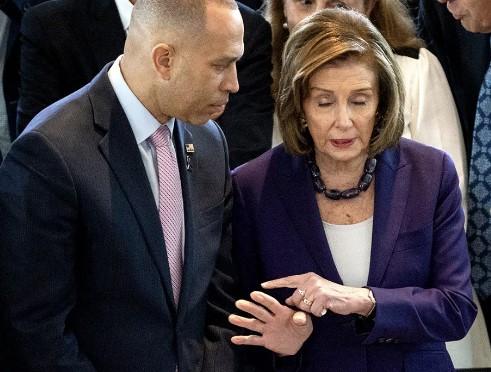
During my time at military school, one moment stood out that echoes today’s political theater. While I jokingly declaring “Black Power” during a casual gathering, a higher-ranked white cadet calmly placed his hand over my fist and quipped, “With white supervision.” It was a sharp, humorous reminder of authority dynamics. That moment mirrors the Democratic Party’s leadership, where Nancy Pelosi’s lingering influence overshadows Hakeem Jeffries’ nominal role as House Minority Leader.
Pelosi: Still the Shot Caller
Nancy Pelosi, House Speaker Emerita, remains a force to reckon with, even after stepping back from formal leadership. Her recent comments criticizing the Biden campaign’s timing and suggesting alternative candidates have ignited frustration among Democrats. While her allies may credit her for orchestrating Biden’s exit from the 2024 race, her public critiques have disrupted party unity.
And this tension isn’t just ideological—it’s deeply personal. Members of the Congressional Black Caucus have voiced concerns, albeit anonymously, about Pelosi’s refusal to fully relinquish control. “She needs to take a seat,” one CBC member remarked, highlighting the dissonance between Pelosi’s outsized role and Jeffries’ attempts to lead.
Jeffries: Leader in Name Only?
Hakeem Jeffries was heralded as the new face of Democratic leadership. Yet his tenure has been marked by Pelosi’s shadow looming large. Democrats gained ground in his home state of New York, and Pelosi herself praised his leadership in public statements. Yet her actions, including media comments and maneuvering behind the scenes, suggest a lack of confidence in his ability to independently guide the party.
The irony here is rich. Pelosi’s calculated moves have effectively positioned Jeffries as a figurehead, “Black power with white supervision”. Clearly, the Democratic Party’s internal dynamics seem to reflect this metaphor perfectly—Jeffries standing tall in theory, while Pelosi ensures the real power remains firmly in her grasp. But then again, this has always been how Democrats operated, particularly as it relates to Black leadership.
The Democrats’ Leadership Dilemma
The underlying issue isn’t just Pelosi or Jeffries—it’s the party’s broader inability to transition smoothly. Pelosi’s refusal to “fade into the sunset” undermines the very leadership she claims to support. As one CBC member put it, “She needs to understand what her new role is.” But this dynamic goes beyond Pelosi and Jeffries. It exposes a couple of things.
First, Jeffries is not a leader or he would show it. He apparently can’t take charge enough for Pelosi to know her “new role”. And second, the Democrats are unable to unite under clear, decisive leadership, because they have far too many special interests.
Thus, when Pelosi openly critiques strategy and stirs intraparty conflicts, it emboldens factions to prioritize their grievances over collective goals. Jeffries’ conciliatory tone—telling members that “the buck stops with me”—rings hollow when the reins of power are still firmly in Pelosi’s hands.
Recriminations and Repercussions
The party’s infighting has broader implications. Pelosi’s comments have reignited debates about the Biden-Harris ticket, exposing fault lines that Republicans are eager to exploit. This isn’t just a question of optics—it’s about trust and cohesion within the Democratic ranks. If Pelosi continues to undercut Jeffries publicly, the party risks alienating not only its leadership but also its base. And therein lies the delicious dilemma for Democrats: allow a truly feckless Black man to take control of the party and risk it looking metaphorically like a modern-day Black-Democrat-controlled big city: gutted and full of despair. Or do Democrats allow old institutionally-racist windbag to continue to call the shots.
The Bottom Line
Democrats love to preach about unity and progress, but their actions reveal a different story. Pelosi’s refusal to step back shows that, for all their talk of diversity and inclusion, the Democratic Party remains firmly rooted in its old guard. Jeffries may hold the title, but Pelosi holds the power—a dynamic that underscores the hypocrisy of a party that claims to champion new leadership while clinging to its racist past.
In the end, the Democrats’ leadership crisis boils down to this: Can Jeffries ever truly lead while Pelosi’s hand remains on his metaphorical fist? Until the party resolves this internal struggle, their calls for progress will remain as empty as their campaign promises.



